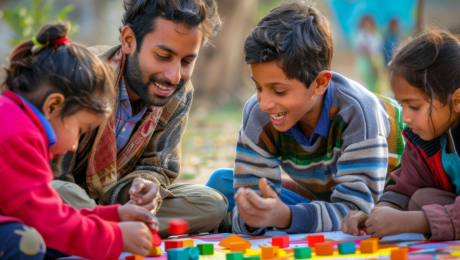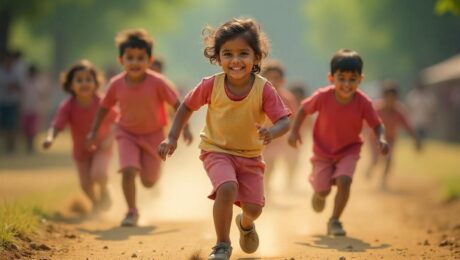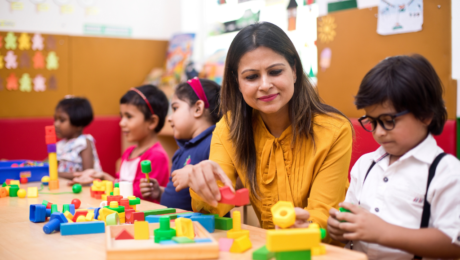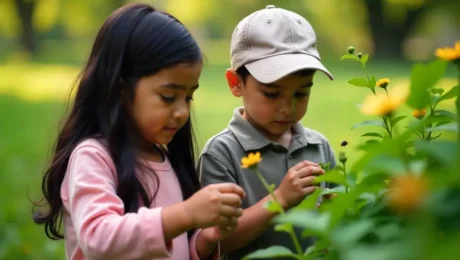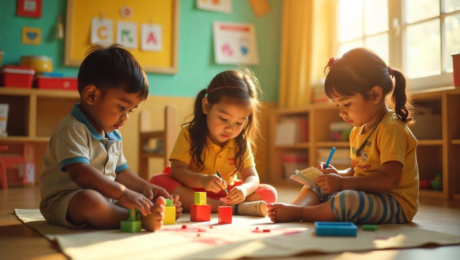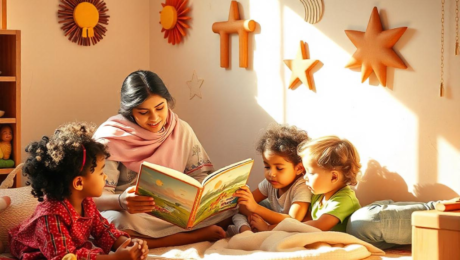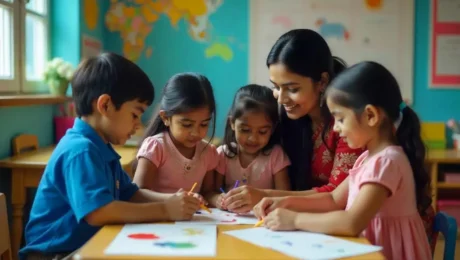Beyond the Classroom: Fun Preschool Activities for Your Little Ones
Have you ever wondered what makes preschool such an exciting adventure for little ones? It’s not just the colorful toys or sing-alongs. It’s the engaging preschool activities designed to help shape curious minds, build bonds, and spark creativity.
These activities are like mini adventures for the little ones, packed with learning disguised as fun. From giggles during game hours to the joy of discovering how colors mix, these moments build skills that a child will carry forever. In this article, we will learn how preschool activities shape a child’s future. So, let’s get started!
How Preschool Activities Shape a Child’s Future
Preschool activities are more than playful engagements; they lay the foundation for a child’s cognitive, emotional, social, and physical development. Here’s how preschool activities shape the future of a child:
Cognitive Development: Preschool activities such as puzzles, story time, and counting games encourage Problem-solving skills, Critical thinking, and Early literacy and numeracy awareness in children. These engagements stimulate brain development, preparing children for more structured learning environments in the future.
Social and Emotional Growth: Participating in group activities helps children develop Communication and cooperation skills with their peers. It also drives empathy and emotional regulation in children and boosts their confidence. Children build emotional intelligence, which is essential for future relationships and teamwork, by learning to interact positively with peers and teachers.
Physical Development: Motor skills are honed through art projects, outdoor play, and building blocks. A healthy body supports an active mind, making physical development integral to overall growth.
Language and Communication Skills: Storytelling, singing, and show-and-tell sessions help children improve their listening skills, verbal expression skills, and vocabulary. These skills form the basis for effective communication and comprehension abilities, which are essential in later schooling years.
Building Independence and Self-Discipline: Structured routines and guided tasks in preschool promote self-regulation and independence, teaching children to follow instructions, take responsibility, manage time efficiently, and carry out tasks.
Creative and Imaginative Thinking: Preschool activities encouraging art, drama, and imaginative play foster creativity, which helps children develop innovative thinking and explore new ideas.
Cultivate a sense of curiosity: Preschool activities have an impact far beyond early learning. They establish the groundwork for lifelong learning, social connections, and emotional well-being.
Preschools play a pivotal role in shaping a child’s future success and happiness by nurturing critical skills during these formative years.
How to Plan Fun-Filled Preschool Activities?
Planning engaging preschool activities requires creativity, structure, and understanding of child development. Follow these steps to ensure activities are fun and educational:
Understand Developmental Goals
Tailor activities to support key areas such as:
Cognitive Development: Simple puzzles, matching games, and number recognition activities
Social-Emotional Growth: Group play, sharing exercises, and role-playing
Physical Development: Outdoor games, obstacle courses, and art projects
Language Skills: Storytelling, singing, and interactive reading sessions
Theme-Based Planning
Select weekly or monthly themes to provide structure and continuity. For example:
Nature Week: Nature walks, leaf art, and learning about plants
Animal Kingdom: Animal crafts, sound recognition, and themed songs
Colors and Shapes: Sorting games, color hunts, and shape tracing
Incorporate a Balance of Activities
Ensure a variety of activities to engage different learning styles and energy levels:
Active Play: Outdoor games, dance sessions, and movement activities
Quiet Time: Reading corners, quiet puzzles, or sensory play
Creative Arts: Drawing, painting, and crafting projects
Free Play: Open-ended activities that let children explore independently
Use Simple Materials
Everyday items can inspire creativity:
Craft materials: Paper, glue, and recycled items
Sensory bins: Rice, water beads, or sand
Nature elements: Leaves, twigs, and stones
Encourage Child Participation
Allow children to influence activity planning by:
- Asking for their input on favorite games or stories
- Observing their interests and expanding activities based on those preferences
Maintain a Routine
Children thrive with a structured routine. Incorporate the following:
- A set time for each activity. For example, snack time, free play time, etc.
- Allow transition time to prepare children for the next task.
Make Activities Inclusive
Ensure all children feel engaged and capable by:
- Offering activities with varying difficulty levels
- Providing support for different abilities
- Encouraging teamwork and positive reinforcement
Well-planned, fun-filled preschool activities nurture curiosity, build essential skills, and foster a love for learning. Teachers and caregivers can create a joyful and stimulating environment that supports holistic development by understanding children’s needs and interests.
- Published in Best Play School
Kindergarten Sports Day Ideas: Planning Activities for Kids
Fred Rogers once said, “Play gives children a chance to practice what they are learning,” what better way to celebrate this than with a Kindergarten sports day? Imagine a day filled with giggles, boundless energy, and tiny feet racing toward the finish line. It’s not only about winning medals but nurturing teamwork, confidence, and joy in the hearts of our little athletes. However, sometimes organizing a perfect sports day for kindergarten gets really daunting. In this article, we have shared some kindergarten sports day ideas, including some theme ideas for sports day. Read this article till the end if you are willing to plan a fun and engaging sports day for kids.
Kindergarten Sports Day Ideas
Looking for some kindergarten sports day ideas? Here are some of the sports day games ideas for kindergarten which you may consider while planning activities for sports day at your playschool:
Mini Obstacle Course: Set up an age-appropriate obstacle course with cones, tunnels, and soft hurdles. Kids can race through, promoting coordination and fun.
Sack Race: A classic game where kids jump in large sacks to reach the finish line. It encourages physical activity and laughter!
Balloon Pop Relay: Each child runs to a spot, pops a balloon by sitting on it, and returns to tag the next teammate. This is fun and builds excitement.
Tug of War (with a Twist): Use a soft, colorful rope and let children compete in teams. Keep it light-hearted and safe, focusing on teamwork.
Fruit Relay Race: Kids carry a plastic fruit or vegetable in a spoon and race to the finish line. It’s a fun way to build balance and motor skills. You can consider this idea if you are looking for some unique sports day race ideas for kindergarten.
Parachute Play: Use a large colorful parachute for games like “popcorn,” where kids shake it to bounce balls, or “mushroom,” where they raise it high and sit underneath.
Hula Hoop Challenge: Let kids see who can hula hoop the longest. It’s a fun way to improve balance and coordination.
Animal Races: Have kids pretend to be animals like frogs, crabs, or bears, hopping or crawling to the finish line. It’s hilarious and encourages creativity.
Ball Toss: Set up buckets or hoops and have the children try tossing softballs into them. This helps develop hand-eye coordination.
Themed Dress-Up Race: Choose a fun theme (superheroes, favorite animals) and let kids race in costumes that match the theme.
These activities combine exercise with tons of fun, making Kindergarten Sports Day an unforgettable experience!
Kindergarten Sports Day Theme Ideas
Looking for unique kindergarten sports day theme ideas? Here are some of the theme-based sports day decoration ideas for kindergarten:
Superheroes: Let the kids dress as their favorite superheroes and participate in “superpowered” races and obstacle courses. You can have a “save the day” relay or “super strength” tug-of-war.
Animals: Each child can dress as their favorite animal, with activities like “frog jumps,” “elephant stomps,” or “cheetah races.” Themed animal stations can add extra fun.
Under the Sea: Dive into ocean-themed races and activities like “fish swim race,” “octopus tentacle relay,” and “starfish balance challenges.” You can even decorate with blue streamers and inflatable sea creatures.
Space Adventure: Explore the universe with “astronaut races,” “alien toss,” and “moon hopping.” Kids can wear space-themed costumes, and the venue can be decorated like a galaxy.
Also Read: From Relay Races to Obstacle Courses: Kindergarten Sports Day Ideas You’ll Love
Fairy Tales: Have a “princess race,” “dragon egg toss,” or “knight’s obstacle course.” Kids can dress as fairytale characters, bringing magic and imagination to the event.
Dinosaur Dig: Kids can race like dinosaurs, do a “dinosaur egg hunt” in the sand, or have a “dino dash.” The theme is perfect for a prehistoric adventure!
Circus Extravaganza: Create a circus atmosphere with fun activities like “clown races,” “tightrope walks” (balancing), and “ring toss” games. Themed costumes can include clowns, acrobats, and ringmasters.
Sports Around the World: Introduce kids to different global sports, like “sack races from Australia,” “soccer dribbling from Brazil,” or “hurdle races from the UK.” This theme is educational and exciting!
Jungle Safari: Let kids explore the “jungle” with activities like “monkey swings,” “tiger chases,” and “elephant stomp.” Kids can dress in animal print and participate in safari-themed games.
Construction Zone: Let kids race with “diggers” (plastic shovels), carry “bricks” (soft objects), and complete “building” challenges, all while dressed like little builders.
These themes make Kindergarten Sports Day even more exciting and offer endless opportunities for creative games and costumes!
- Published in Best Play School
Play School in Noida: Where Joy and Learning Goes Hand in Hand
Are you looking for the perfect playschool in Noida? Well, you are in the right place! Choosing a play school is not just about finding the right place where your child can spend his/her mornings. It is also about finding a nurturing environment where they will laugh, learn, and grow. Noida is buzzing with fantastic options, but honestly, it gets overwhelming to decide which one is the best fit. So, whether you are looking for a curriculum that sparks creativity, teachers who feel like family, or activities that make learning fun, we have got you covered. Let’s dive into some of the best play schools in Noida and find the ultimate launchpad for your child’s bright future.
Top 5 Best Play Schools in Noida
The list of the top 5 best play schools in Noida is as follows:
Little Scholar
Little Scholar is a nurturing educational space in Noida designed to inspire young minds and foster holistic development. With a child-centric approach, the playschool offers a stimulating environment where creativity, curiosity, and confidence thrive. The curriculum blends structured learning with play-based activities, encouraging cognitive, social, and emotional growth. Experienced educators ensure every child feels valued and supported, laying a strong foundation for lifelong learning. Little Scholar also emphasizes values, teamwork, and individuality, creating a well-rounded experience. Modern facilities, safe infrastructure, and engaging programs make it a trusted choice for parents seeking quality early education for their little ones.
EuroKids Preschool
EuroKids is a play school in Greater Noida. It is known for offering a fun and engaging learning environment tailored to young children. With its innovative curriculum, the school fosters holistic development through play-based learning and creative activities. It emphasizes safety, hygiene, and a nurturing atmosphere, ensuring children feel secure while exploring their potential. The school integrates modern teaching methods with traditional values to build a strong foundation for early education. Additionally, EuroKids provides age-appropriate programs for toddlers and preschoolers, encouraging intellectual, emotional, and social growth in a vibrant and inclusive setting.
Maple Bear Canadian Preschool
Maple Bear Canadian Preschool in Greater Noida stands out for its globally acclaimed Canadian curriculum, which combines academic excellence with a nurturing environment. It focuses on experiential and bilingual learning, encouraging creativity, problem-solving, and communication skills in young learners. The school provides age-appropriate programs for toddlers and preschoolers, fostering intellectual, emotional, and social growth. With a strong emphasis on safety, hygiene, and an engaging infrastructure, Maple Bear ensures a warm, inclusive setting where children thrive. It’s a trusted choice for parents seeking a comprehensive early education for their children.
Also Read: The Little Scholar Playschool- Best Noida Preschool
Pehal Preschool
Pehal Preschool in Greater Noida is a vibrant and nurturing early learning institution designed to foster a child’s intellectual, emotional, and social growth. Known for its serene green surroundings and spacious play areas, Pehal offers an enriching environment for young minds to explore and learn. The school’s curriculum emphasizes experiential learning, creativity, and interactive activities encouraging holistic development. With a strong focus on safety and hygiene, Pehal provides a secure space where children can thrive while building a solid foundation for their academic journey.
Modern Montessori International (MMI) Noida
Modern Montessori International (MMI) is one of the premier preschools in Noida. It is known for its globally recognized Montessori teaching methodology. Focused on fostering independence and creativity, MMI provides an engaging and child-centric learning environment. The school emphasizes individualized attention, allowing children to learn independently while developing critical thinking and problem-solving skills. With state-of-the-art facilities, experienced educators, and a focus on holistic growth, MMI ensures a nurturing space for young learners. It’s an excellent choice for parents seeking a blend of traditional Montessori principles and modern educational practices.
FAQs:
Which school is the best play school in Noida?
Little Scholar is one of the best play schools in Noida. Apart from that, you can also opt for Modern Montessori International or Maple Bear Canadian Preschool in Noida and Greater Noida.
Average fees of play school in Noida?
The average yearly fees of a play school in Noida can range from INR. 15,000 to INR. 1,49,000, depending on its quality and infrastructure.
Should I enroll my child in a play school in Noida?
Yes, enrolling your child in a play school can benefit him/her. You may also enroll your child at a daycare in Noida, which will prepare your child for play school.
- Published in Top Play School
Finding the Best Daycare Near Me: Where Little Smiles Grow Big!
We all know the heart-wrenching feeling of leaving your little one behind as you step out to conquer the world. In the words of Oprah Winfrey, “The best gift you can give to your children is your time.” But the reality speaks something else. With hectic work schedules and managing responsibilities, giving proper time to our children often gets very difficult. That’s where a daycare center comes to your rescue. The right daycare center will offer a nurturing environment to your children and focus on their overall development. If you are constantly searching for “Best daycare near me” online, this article might be the right one for you. In this article, we have covered some of the best daycare centers in Noida. If you are a resident of Noida, this article might help you to choose the best daycare for your child.
Top 5 Best Daycare Centers in Noida
Here is a list of top 5 best day care centers of Noida. If you are from Noida and searching for ‘best daycare centres near me’, you have arrived at the right spot.
Little Scholar Preschool and Daycare
Little Scholar Preschool and Daycare in Noida is a trusted institution offering a nurturing and safe environment for children aged 1.5 to 5 years. Known for its experienced staff and child-friendly infrastructure, it provides a well-rounded curriculum focusing on academics, physical activities, and creative learning. The daycare is equipped with CCTV surveillance, ensuring safety and transparency for parents. Children benefit from engaging in activities that enhance social, emotional, and cognitive skills, making it a preferred choice for working parents in the region. Little Scholar emphasizes a homely atmosphere combined with educational excellence to prepare children for formal schooling.
KLAY Preschool and Daycare
KLAY Preschool and Daycare is a leading childcare center in Noida, designed to support the holistic development of children aged 6 months to 6 years. With a structured curriculum that combines academics and play, it nurtures cognitive, social, and emotional growth. The daycare offers a secure environment with live CCTV access for parents, well-trained staff, and hygienic premises. Activities like art, storytelling, and outdoor play are tailored to enhance creativity and motor skills. KLAY is a trusted choice for working parents, ensuring a safe, engaging, and stimulating atmosphere for children to thrive.
Footprints Childcare
Footprints Childcare is a premium daycare and preschool chain in Noida, catering to children aged 6 months to 6 years. Renowned for its technology-enabled services, it provides parents with live CCTV access for real-time monitoring. Footprints emphasize a holistic approach, offering a research-based curriculum to foster cognitive, physical, and emotional development. With a focus on safety and hygiene, the daycare also serves nutritious meals to ensure children’s well-being. Engaging activities such as yoga, storytelling, and art create a stimulating environment that supports early learning while addressing the needs of working parents.
Petals Preschool and Daycare
Petals Preschool and Daycare in Noida is a well-established childcare center offering a UK-based Early Years Foundation Stage (EYFS) curriculum for children aged 6 months to 10 years. It focuses on holistic development through play-based learning, fostering creativity, critical thinking, and social skills. The daycare provides a safe and nurturing environment with separate nap areas and freshly prepared, nutritious meals curated by an AIIMS-certified nutritionist. With a low child-to-staff ratio and emphasis on cleanliness and safety, Petals ensures personalized attention and a positive learning experience, making it a popular choice for working parents.
Also Read: What is a Daycare Center- Types and Benefits
Maple Bear Canadian Preschool
Maple Bear Canadian Preschool and Daycare in Noida offers a globally recognized curriculum that blends Canadian educational practices with local cultural elements. Designed for children aged 6 months to 6 years, it emphasizes bilingual learning, creativity, and cognitive development through play-based methodologies. The daycare ensures a safe, hygienic, and child-friendly environment with attentive staff and nutritious meal plans. Maple Bear focuses on holistic growth, fostering social, emotional, and academic skills, and preparing children for future success. Its reputation for high-quality education and care makes it a top choice for parents seeking comprehensive childcare solutions.
FAQs:
What are the best daycares near me?
If you are a resident of Noida, here are some of the best daycare centers in your city: Little Scholar, KLAY Preschool and Daycare, Footprints Childcare, Petals Preschool and Daycare, and Maple Bear Canadian Preschool.
How do I find the best daycare near me in Noida?
Follow the following steps in order to find the best daycare near your place in Noida:
- Look for daycare centers with good reviews.
- Look for recommendations from your friends and relatives.
- Visit the shortlisted daycare centers to understand the environment they will offer for your child.
- Consider your budget and choose the one that offers value for money.
- Published in Top Play School
Day Boarding Schools in Noida: Education, Creativity, and Everything In Between
Choosing the right day-boarding school for your child in Noida can feel overwhelming, but you no longer have to worry. If you live in Noida, the good news is that Noida is home to some excellent day boarding schools. These schools are known for balancing academic achievement and personal development perfectly. Whether you are searching for a school that fosters creativity and education or emphasizes overall growth, day boarding schools in Noida offer various options to suit every need. These schools create a safe and supportive environment where kids can excel academically while growing socially and emotionally. In this article we will be learning about the top 5 best day boarding schools in Noida so that you can choose the best for your child.
Top 5 Day Boarding School in Noida
Little Scholar: Little Scholar, Noida, is a highly reputed preschool committed to offering a safe, nurturing, and stimulating environment for young learners. Established with a vision to provide quality early education, it emphasizes a play-based curriculum designed to foster creativity, critical thinking, and emotional well-being. The school integrates modern teaching methods with traditional values, ensuring children develop holistically. With its well-equipped classrooms, experienced teachers, and engaging extracurricular activities, Little Scholar Noida is popular among parents seeking a solid foundation for their child’s academic and personal growth. For detailed information, visit their official website or contact their administration.
Aster Public School: Aster Public School in Greater Noida West offers a nurturing environment for toddlers with its specialized Toddler Program. The school follows the CBSE curriculum and emphasizes early childhood development, focusing on building a strong foundation in academics, social skills, and creativity. With a modern campus, experienced faculty, and state-of-the-art facilities, Aster Public School ensures a balanced learning approach, encouraging young learners’ physical, emotional, and intellectual growth. The school is known for its commitment to providing a safe and stimulating environment where children can thrive and develop their full potential.
Samsara The World Academy: Samsara The World Academy, located in Greater Noida, is a prestigious co-educational school that offers a unique blend of Montessori and CBSE curricula. The school is dedicated to fostering creativity, critical thinking, and emotional development from an early age. With a modern campus and experienced faculty, Samsara provides a rich environment for young learners, encouraging their growth through play, exploration, and hands-on learning experiences. The school is known for its strong emphasis on individualized attention and holistic development, ensuring a well-rounded education for toddlers and older students.
Also Read: Discover the Top Benefits of Enrolling Your Child in a Day Boarding School in Noida
Ryan International School: Ryan International School, Greater Noida, is part of the renowned Ryan Group of Institutions, known for its commitment to academic excellence and all-round development. Affiliated with CBSE, the school offers a blend of modern teaching techniques and traditional values, focusing on intellectual, physical, and emotional growth. The campus boasts top-notch infrastructure, including science and computer labs, sports facilities, and a library. With a strong emphasis on extracurricular activities and leadership development, Ryan International School provides a well-rounded education. The school’s holistic approach and experienced faculty make it a top choice for parents looking for quality education.
Cambridge School: Cambridge School, Greater Noida, is a well-established institution that provides a nurturing environment for young learners. Affiliated with the CBSE board, the school offers a balanced curriculum for toddlers focusing on early childhood development through play and exploration. The modern infrastructure and experienced faculty ensure that each child receives individualized attention, fostering creativity, emotional intelligence, and foundational academic skills. Cambridge School is known for its emphasis on extracurricular activities alongside academic learning, creating a well-rounded student experience. It is ideal for parents seeking quality education in a safe and stimulating environment.
FAQs:
What is the best day boarding school in Noida near Delhi?
Little Scholar is one of the best day boarding schools in Noida and is also quite close to Delhi.
What is the best day boarding school for toddlers?
Little Scholar is one of the best day boarding schools for toddlers, offering a nurturing environment for kids to grow through play-based learning.
How do you select the best day boarding school in Noida?
Keep the following points in mind while choosing a day boarding school for toddlers in Noida:
- Research the curriculum, faculty, and school staff.
- Know about the infrastructure of the school.
- Consider the location of the school for ease of traveling.
- Evaluate value for money.
- Published in Best Play School
Starting Early: Knowing The Right Preschool Age in India
When we think of preschools, the only thing that comes to our mind is those tiny backpacks and those tiny steps toward learning. Getting enrolled in a preschool is essential as it lays the foundation of a child’s academic and social development. What is more important is to know what is the right preschool age in India for getting your child enrolled.
In the words of Albert Einstein, “Education is not just about learning facts, but the training of the mind to think”. In a country as diverse as ours, where every state, religion, and culture offers something unique, the preschool journey is simply not about mugging up facts. It’s a fun, play-based learning experience for children where they are exposed to different cultures and circumstances. In this article, we will explore the preschool scenario in India and learn about the right age for preschool. So let’s get started!
What Does Preschool Education Look Like in India?
Preschool education in India has come a long way in the last few decades, evolving from informal daycare services to structured, activity-based learning environments. As parents increasingly recognize the importance of early childhood education, the landscape of preschools in India has diversified to cater to different learning needs, cultural contexts, and educational philosophies. Here’s a look at what preschool education typically looks like in India today:
Types of Preschool Institutions in India
- Nursery Schools / Play Schools.
- Montessori Schools.
- Kindergarten (KG).
- Play-Based and Activity-Based Preschools.
Key Features of Preschool Education in India
Play Based Learning: In India, a significant portion of preschool education is based on play-based learning. Research has shown that children learn best through play, as it stimulates their imagination, cognitive skills, and social development.
Focus on Socialization: Preschools in India put a strong emphasis on social skills. These early years are critical for children to learn how to interact with peers, share, and cooperate. Teachers guide children in developing positive relationships, learning about emotions, and expressing themselves appropriately.
Basic Academic Skills: While play-based learning dominates, preschools in India also focus on preparing children for formal schooling. Some of the early learning concepts include language development, numeracy skills, and general knowledge.
Motor and Cognitive Development: Preschools incorporate activities designed to build fine motor skills like drawing, cutting, and playing with clay and gross motor skills like running, jumping, and climbing. These activities are essential for physical development and coordination.
Emotional Growth: Preschools in India also emphasize emotional development. Teachers help children recognize and express their emotions, build self-confidence, and deal with challenges in a constructive way.
Also Read: First Step to a Bright Future: Exploring the Importance of Preschool Education
What is the Right Age for Preschool in India?
Identifying the best age to start preschool can be a challenging task for parents. In India, the ideal age for preschool typically falls between 3 to 6 years, but it depends on various factors like your child’s development, family needs, and the type of preschool program you choose. Here’s a closer look at the ideal preschool age and what to consider before making the decision.
The Typical Playschool Age Range in India
Preschool (Nursery or Kindergarten) in India is generally meant for children aged 3 to 6 years, and the age breakdown is typically as follows:
Playgroup (Age 2-3 years): Some preschools start at this age for children who are ready to begin socializing and learning basic routines. Playgroup is often the first introduction to formal education.
Nursery (Age 3-4 years): The most common starting point for many children, where they begin learning foundational skills like colors, shapes, and basic socialization.
Lower Kindergarten (LKG) (Age 4-5 years): This level introduces more structured learning, including basic reading, writing, and math concepts.
Upper Kindergarten (UKG) (Age 5-6 years): UKG prepares children for primary school by focusing on more formal academic skills, social development, and school readiness.
Preschool education in India is an exciting, diverse, and evolving field. It plays a critical role in the early development of children, laying the foundation for lifelong learning.
FAQs:
What age is best for playschool and kindergarten?
Usually, the best age for playschool and kindergarten is 2.5 to 3.5 years for play school and 3 to 4 years for kindergarten. However, it also depends on the child’s development and readiness for preschool.
What age is best to start play school?
The best age to start play school is between 3 to 5, but it also depends on the child’s development and overall readiness to go to playschool.
- Published in Top Play School
Eco-Fun for Little Ones: Best Green Day Activities for Kindergarten
Someone rightly said that children are like sponges. They soak up everything around them. So why not let me soak some environmental awareness through the Green Day celebration at preschools? Green Day activities for kindergarten are not just about wearing green outfits, but the bigger objective is to teach them the joy of nature, the importance of sustainability, and the magic of small, everyday actions that can make a difference.
So, if you are ready to spark some love for the environment within children through some fun and engaging activities, this article is for you. Read this article till the end to find out some interesting activities for Green Day and why these activities are important.
Why Do Green Day Activities Matter for Kindergarten?
Here’s why Green Day activities are important for kindergarten:
Fosters Early Environmental Awareness: Introducing young children to environmental concepts early helps them develop a sense of connection to the planet and an understanding of the importance of protecting it.
Teaches Responsibility and Stewardship: Through activities like planting or recycling, kids learn to take responsibility for their actions and how they impact the world around them, laying the foundation for lifelong eco-conscious habits.
Encourages Creativity and Problem-Solving: Green Day activities, such as creating art from recycled materials or designing eco-friendly projects, stimulate creativity while teaching kids to think critically about sustainability.
Promotes Physical Activity and Outdoor Exploration: Activities like nature walks get children outside, encouraging physical activity and helping them develop a deeper appreciation for nature.
Supports Cognitive and Social Skills Development: Hands-on, nature-based activities allow children to practice teamwork, problem-solving, and communication while learning about the environment interactively.
Builds a Foundation for Eco-Friendly Habits: Early exposure to sustainable practices, such as recycling, conserving resources, and reducing waste, helps kids form habits that will stay with them throughout their lives.
Strengthens Emotional Connections to Nature: When kids engage with nature, they often develop an emotional bond with it, fostering empathy for animals, plants, and ecosystems, which can motivate them to care for the Earth.
Encourages a Global Perspective: Teaching young children about environmental issues on a global scale, like climate change or deforestation, in an age-appropriate way helps them understand the broader implications of their actions.
Also Read: Making Unforgettable Memories: Fun Blue Day Activity for Preschool
Best Green Colour Day Activity for Kindergarten
Here is a list of some of the best Green Day activities for kindergarten at Little Scholar:
Green-themed Arts and Crafts: Children create green-themed artwork using green paint, crayons, or colored paper. For example, drawing trees, leaves, or frogs. It reinforces color recognition and encourages creativity.
Green Sensory Bin: They fill a sensory bin with green items like leaves, plastic plants, green rice, or green toys. It drives sensory development in children.
Green Food Tasting: Children have a green snack day with cucumbers, grapes, kiwi, or spinach. It introduces healthy eating habits while exploring the color green.
Green Nature Walk: They also walk outside to observe and collect green items from nature, such as leaves, grass, or moss. It encourages outdoor exploration and connection to nature.
Green-themed Storytime: Children read books featuring green objects or characters, like “Green Eggs and Ham” by Dr. Seuss. It promotes literacy and reinforces the color green in a fun context.
Green Color Sorting: Sort various objects into a “green” category for example, green blocks, paper, or toys. It enhances color identification and sorting skills.
Greenday Plantation Drive: Children plant seeds in green pots and watch them grow. It teaches the basics of plant life cycles and responsibility.
Green Dress-Up Day: Encourage kids to wear green clothing or costumes like frogs, trees, or leaves. It is a fun and interactive way to celebrate green while encouraging creativity.
Green Recycling Project: Children use green recyclable materials like plastic bottles or paper to create eco-friendly crafts. It teaches them sustainability and creativity while emphasizing the importance of recycling.
These Preschool Green colour day activities for kindergarten engage them in a fun, hands-on way to learn about the color green while incorporating nature, creativity, and eco-consciousness.
- Published in Top Play School
Making Learning Fun: Daycare Activities That Boost Kids’ Skills
In Maria Montessori’s wise words, “Play is the work of the child.” And what better place for work to unfold than in a daycare setting that fosters exploration, imagination, and curiosity? Whether it’s a finger-paint masterpiece or a game of musical chairs, daycare activities are not just about passing the time; they are more about laying the groundwork for essential life skills.
What are some daycare activities that keep toddlers engaged and set them up for success later on? This article will explore these activities. So, let’s dive in and have a look at some of the fun and engaging daycare activities for kids.
Play-Based Indoor Daycare Activities
Here’s a list of engaging play-based indoor daycare activities ideas that foster creativity, learning, and development:
Pretend Play Stations: Set up play areas like a kitchen, grocery store, or doctor’s office where children can role-play. This activity develops social skills, imagination, empathy, and problem-solving skills in children.
Art and Craft Time: Provide paper, crayons, markers, glue, and other materials for children to create artwork and crafts. This activity enhances children’s creativity, hand-eye coordination, and color recognition skills.
Puzzle Play: Give children age-appropriate puzzles to complete, focusing on shapes, colors, and matching. This activity develops problem-solving, critical thinking, and concentration skills in children.
Storytime and Puppet Shows: Read stories aloud or use puppets to engage children in imaginative play and storytelling. It helps with language development, listening skills, and imagination in children.
Cooking and Baking Play: In India, children use pretend food items or safe cooking tools to prepare meals or bake treats in a pretend kitchen. This activity develops creativity, social skills, and fine motor skills.
Clay or Playdough Sculpting: Give children playdough or clay to mold into shapes, animals, or abstract designs. It develops fine motor skills, creativity, and sensory development in children.
Simple Science Experiments: Introduce fun and simple experiments, like mixing colors, floating objects, or making bubbles. It makes children curious, enhancing critical thinking in children.
These play-based daycare activities are designed to keep children engaged while encouraging them to develop essential skills in a fun and interactive way. The best part? They promote social interaction, creativity, and physical activity, all of which are key to a child’s growth.
Also Read: What is a Daycare Center- Types and Benefits
Daycare Outdoor Activities
Here’s a list of fun and engaging outdoor daycare activities that encourage physical activity, creativity, and social development in children:
Ball Games: Play games like soccer, catch, or kickball with soft balls or beach balls. These activities develop gross motor skills, hand-eye coordination, and team spirit in children.
Obstacle Course: Set up an outdoor obstacle course using cones, ropes, tires, and other materials for crawling, jumping, and balancing. It develops balance, coordination, and physical fitness in children.
Gardening: Let children plant flowers, herbs, or vegetables in pots or small garden beds and help care for them. This makes them environmentally aware and teach them to be responsible towards nature.
Nature Art: Collect natural items like leaves, flowers, and sticks and use them to create art projects outside. This activity helps children to enhance creativity, and motor skills.
Hide and Seek: A classic game where one child counts while the others hide, promoting physical activity and social interaction.
Benefits of Activities in Daycare
Daycare activities play a vital role in a child’s growth, offering more than just fun. Here’s how they help:
Cognitive Development: Daycare activities stimulate problem-solving, critical thinking, and creativity through games, puzzles, and storytime. They also boost language and communication skills with group interactions and reading.
Physical Development: Activities in daycare promote gross motor skills through active play like running and climbing and enhance fine motor skills with activities like drawing, building, or manipulating small objects.
Social Development: These activities teach teamwork, sharing, and conflict resolution through group activities and play. They also encourage empathy and respect as children learn to interact with peers.
Emotional Development: These activities build self-esteem and confidence with accomplishment-based activities. They also help with emotional regulation by teaching children to manage frustration and express feelings.
School Readiness: Activities in a daycare lay the foundation for academic skills such as counting, letter recognition, and early literacy. They encourage curiosity in children and develop a love for learning through exploration and discovery.
Behavioral Skills: These activities also help children learn boundaries, patience, and how to handle setbacks through structured activities.
Overall, daycare activities nurture children’s cognitive, physical, social, and emotional growth, preparing them for school and life ahead.
- Published in Best Play School
Why Creche Centres Are the Secret to Your Child’s Happy Start in Life
Why Creche Centres Are the Secret to Your Child’s Happy Start in Life
As a working parent, the real challenge lies in juggling work, personal life and everything in between. Finding the right childcare option in such a situation may feel like an overwhelming task. But guess what, you are not all. Thus, we have created an article on creche centers.
A creche center is not just a place where you can drop your little one off while you head to work. It is a safe haven for your child, a nurturing space where children can start to explore their world, make new friends, and engage in fun learning activities. If you still have doubts about creche centers, read this article till the end. You will come across every detail about a creche center, its benefits, cost, and how it differs from a daycare center. So let’s get started!
What is a Creche Centre and How Does it Help Parents?
A creche center is a childcare facility that temporarily cares for young children, typically infants to preschoolers, while their parents are at work or otherwise unavailable. These centers are designed to offer a safe, nurturing environment where children can play, learn, and develop social skills under the supervision of trained caregivers.
Creche centers help parents by offering:
Convenience and Flexibility: They provide parents with flexible hours of care, often offering part-time or full-time options, making it easier for working parents to balance their careers and family life.
Childcare and Early Learning: In addition to basic care, creche centers often incorporate early education programs that stimulate cognitive, social, and emotional development through play-based activities.
Peace of Mind: Knowing that their child is in a secure, supervised environment with experienced staff allows parents to focus on their work, confident that their child is being well cared for.
Overall, a creche center supports parents by providing reliable childcare while fostering early childhood development in a safe, enriching environment.
Cost of Creche Centre in India
The cost of a creche center in India can vary widely based on several factors, such as:
Location: Costs are generally higher in metropolitan cities like Delhi, Mumbai, Bangalore, and Chennai due to the higher cost of living and demand for childcare services.
Type of Facility: Premium or international creches offering advanced educational programs, better facilities, and a higher caregiver-to-child ratio tend to be more expensive than basic daycare centers.
Age of the Child: Fees may vary based on the child’s age. Younger children often require more personalized care, which can increase the cost.
Timings: Full-day care is typically more expensive than part-time or half-day services.
Creche center fees in India typically range from Rs. 2,000 to Rs. 20,000 per month. The cost of a creche center in Noida will typically range from Rs. 8,000 to Rs. 20,000 per month.
Also Read: Parenting Made Easier: The Joys of Creche Daycare!
Creche Centre vs. Daycare Centres: Basic Differences
While both creche centers and daycare centers provide childcare services, they differ in certain aspects, like age range, services offered, and structure. Here are the basic differences between creche center and daycare:
Target Age Group:
Creche Centres: Primarily cater to younger children, typically infants to preschoolers aged 0-5 years.
Daycare Centres: Generally serve a wider age range, from infants to school-age children aged 0-6+ years.
The Focus of Services:
Creche Centres: These are primarily focused on basic childcare like feeding, napping, and ensuring safety for infants and toddlers.
Daycare Centres: Daycares may offer a mix of care and early learning programs.
Duration of Care:
Creche Centres: Creches typically operate for shorter hours, often catering to working parents who need care for just a few hours during the day.
Daycare Centres: Most daycare centers offer full-day care, with flexible options for part-time, full-time, or extended hours, depending on the parent’s needs.
Curriculum and Activities:
Creche Centres: The focus is usually on basic routines such as feeding, diapering, and sleeping, especially for younger children.
Daycare Centres: Daycares often have more structured programs with a curriculum designed to help children develop language skills, motor skills, and basic academic concepts through activities like arts, crafts, games, and songs.
Costs:
Creche Centres: Typically less expensive than daycare centers due to fewer services and a focus on care rather than structured learning.
Daycare Centres: These are often more expensive because they offer extended hours, structured learning programs, and additional facilities.
Both creche centers and daycare centers offer valuable services, but the choice between them depends on your child’s age, your needs, and the level of structured education or care you’re seeking.
- Published in Best Play School
From Crayons to Curiosity: What is Early Childhood Education All About?
Ever wondered why some kids seem to learn so much faster at a young age? All the credit goes to early childhood education. Childhood is a magical time that feels like sowing seeds in a fertile garden. With proper care and nurturing, a child will be able to flourish in the future. Don’t you know what early childhood education is? In this article, we will discuss early childhood education, its importance, and ways to support it. So let’s get started.
What is Early Childhood Education? The Concept & its Importance
Early childhood education is a formal approach that focuses on holistic child development. It includes various educational programs, such as preschools, childcare centers, and home-based programs. The importance of early childhood care and education in India is enlisted below:
- Cognitive Development: Children’s early years are crucial for brain development. Research shows that 90% of brain development takes place by the age of five. ECE provides a stimulating environment that promotes language acquisition, literacy skills, and number skills.
- Social and Emotional Development: ECE helps children develop social skills such as cooperation, empathy, and communication. Through communication with their peers, they learn to express their emotions, resolve conflicts, and build relationships.
- Long-Term Benefits: Studies have consistently shown that children who participate in quality ECE programs are more likely to perform better in school, have higher graduation rates, and enjoy better career opportunities. Furthermore, they are less likely to engage in risky behaviors or experience behavioral problems. The investment in early education has long-lasting effects that extend well into adulthood.
- Preparation for Formal Education: ECE programs prepare children for the transition to primary school by developing foundational skills such as self-regulation, discipline, and a love for learning. Children who engage in ECE are often more confident and better equipped to handle the academic challenges they will face in later years.
How Can Early Childhood Education in Kids Be Supported?
Here are the following ways by which one can support early childhood education in kids:
- Encourage Play-Based Learning: Play is a fundamental component of early childhood development. It allows children to explore, experiment, and make sense of the world around them. Parents can support ECE at home by encouraging imaginative and structured play, such as building with blocks, role-playing, or engaging in creative arts like drawing and crafting. These activities stimulate cognitive development and problem-solving skills.
- Introduce Educational Materials: Providing access to age-appropriate educational materials, such as books, puzzles, and games, can enhance a child’s learning experience. Reading to children regularly, for instance, helps them develop language skills, improves vocabulary, and fosters a love for reading. Parents can also introduce early math concepts through counting games, sorting objects by color or size, and simple board games.
- Establish Routine and Structure: A well-structured daily routine helps children feel secure and understand the importance of time management. Parents can incorporate activities like storytime, creative play, and outdoor exploration into their child’s daily schedule.
- Encourage Social Interaction: Children learn critical social skills through interaction with peers and adults. Encouraging socialization in settings like playgroups, parks, or early learning centers fosters cooperation, sharing, and communication. These interactions are key to building a child’s emotional intelligence and self-regulation abilities.
- Extracurricular Activities: Programs such as music classes, art workshops, or sports camps can complement a child’s early education by fostering creativity, teamwork, and physical development. These activities not only help children discover their interests but also teach discipline, time management, and perseverance.
With that, we have come to the end of this article. We hope that we could address your queries of “what is early childhood education and its importance.” By fostering a stimulating learning environment, encouraging social and emotional development, and engaging with quality educational programs, we can give children the best start to their educational journey.
- Published in Top Play School

